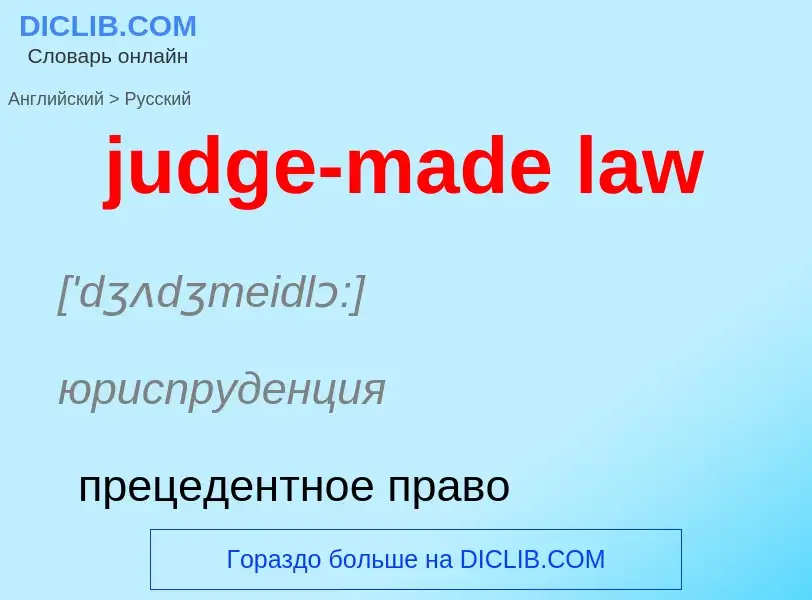Перевод и анализ слов искусственным интеллектом ChatGPT
На этой странице Вы можете получить подробный анализ слова или словосочетания, произведенный с помощью лучшей на сегодняшний день технологии искусственного интеллекта:
- как употребляется слово
- частота употребления
- используется оно чаще в устной или письменной речи
- варианты перевода слова
- примеры употребления (несколько фраз с переводом)
- этимология
judge-made law - перевод на русский
['dʒʌdʒmeidlɔ:]
юриспруденция
прецедентное право
право
созданное на основе судебной практики
Определение
Википедия
A precedent is a principle or rule established in a previous legal case relevant to a court or other tribunal when deciding subsequent cases with similar issues or facts. Common-law legal systems often view precedent as binding or persuasive, while civil law systems do not. Common-law systems aim for similar facts to yield similar and predictable outcomes, and observing precedent when making decisions is the mechanism to achieve that goal. Common-law precedent is a third kind of law, on equal footing with statutory law (that is, statutes and codes enacted by legislative bodies) and subordinate legislation (that is, regulations promulgated by executive branch agencies, in the form of delegated legislation) in UK parlance – or regulatory law (in US parlance). The principle by which judges are bound to precedents is known as stare decisis (a Latin phrase with the literal meaning of "to stand in the-things-that-have-been-decided").
Case law, in common-law jurisdictions, is the set of decisions of adjudicatory tribunals or other rulings that can be cited as precedent. In most countries, including most European countries, the term is applied to any set of rulings on law, which is guided by previous rulings, for example, previous decisions of a government agency. Essential to the development of case law is the publication and indexing of decisions for use by lawyers, courts, and the general public, in the form of law reports. A precedent is a historical setting example for the future (though at varying levels of authority as discussed throughout this article), some become "leading cases" or "landmark decisions" that are cited especially often.
Generally speaking, a legal precedent is said to be:
- applied (if precedent is binding) / adopted (if precedent is persuasive), if the principles underpinning the previous decision are accordingly used to evaluate the issues of the subsequent case;
- distinguished, if the principles underpinning the previous decision are found specific to, or premised upon, certain factual scenarios, and not applied to the subsequent case because of the absence or material difference in the latter's facts;
- modified, if the same court on determination of the same case on order from a higher court modified one or more parts of the previous decision; or
- overruled, if the same or higher courts on appeal or determination of subsequent cases found the principles underpinning the previous decision erroneous in law or overtaken by new legislation or developments.
In contrast, civil law systems adhere to a legal positivism, where past decisions do not usually have the precedential, binding effect that they have in common law decision-making; the judicial review practiced by constitutional courts can be regarded as a notable exception.

